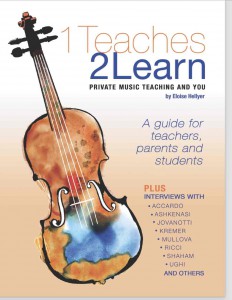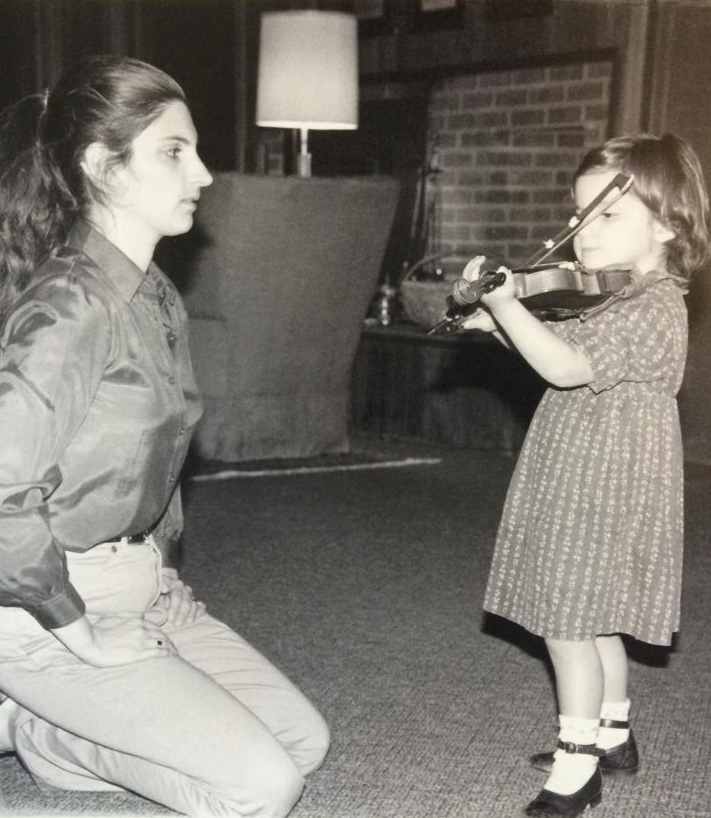When Things Don’t Go Well at a Lesson (so it may seem) – Pointers for Parents
Happiness can be defined as knowing how to do something well. Learning to do it, however, is not always a happy experience. The path to perfection is mined with all kinds of stumbling blocks, most of them within ourselves. Sometimes teachers need to rattle our cages a bit to make us change our outlook, vision, or opinion. When this happens it isn’t always a pretty sight to the observer, but it may be vital to the learning process of the student.
So here are two scenarios. In which lesson did the student learn more?
A. Little Heidi plays her scales and etudes perfectly for her teacher, who then gives her a beautiful new piece as a reward, with pointers on how to practice it. Everyone is happy.
B. Little Gretel practiced her scales incorrectly and didn’t pay attention to her teacher’s instructions on certain difficulties in her etude. When the teacher points this out, Gretel goes into a pout which prompts a thorough dressing down by the teacher – not only about practicing well and listening to her teacher, but how to behave during her lessons. No one is happy.
Which child learned more? I would say that Heidi is probably making better progress on her instrument at the moment, but that Gretel has learned three extremely important lessons vital to her development – not only as a music student but as a human being: (1) technique is important, (2) listening to your teachers’s instructions is even more important, (3) proper attitude is most important because it is essential to learning anything well.
Which lesson went better? Neither one. As a matter of fact, both of them went very well. Lessons are for learning and are not necessarily limited to learning instrumental technique and mutual admiration between teacher and student. Parents may think a lesson like Lesson B is a miserable failure. Not so – it may be the best lesson some children will ever experience. And the funny thing is that they know it, even at a very tender age.
Yehudi Menuhin reported in his autobiography (“Unfinished Journey” 1976) that his teacher, Louis Persinger, once angrily reproached Yehudi for not having properly studied a Mozart concerto he had assigned him. But did Menuhin mention this episode some fifty years later because he was upset with his teacher? No, it was because his mother had “helicoptered in” to insist that Persinger apologize to her son, who in turn was shocked and sorry to see his teacher humiliated. He felt his mother should not have interfered because Persinger was right: he had not practiced properly and deserved to be called on it. In fact, because of this episode, Yehudi “discovered” Mozart and was glad that his teacher had so brusquely insisted on his learning the concerto well. Menuhin was only 8 years old when this happened, by the way. Even small children can have a very well developed sense of justice.
To give an example from my own experience: I had a nine year-old student whose mother had decided to enroll her in the local conservatory. I told the mother that the child was too young, but the decision had been made, so it was my job to prepare her for the entrance exam, as well as for lessons with another teacher in a professional environment where the mother’s presence would not be allowed. One day, while I was trying to help this little girl understand what her teacher at the conservatory would require of her, I found it necessary to reprove her for failing to complete an assignment I myself had given her. Suddenly the mother jumped up, snatched the child’s violin, threw it in the case, grabbed the child, told me in a loud voice that I was the worst teacher she ever knew, that she was sorry she ever sent me other students, and left, slamming the door behind her. I remember thinking, “Strange, my instinct doesn’t usually fail me.” That night the mother called me, sobbing, begging me to forgive her. Apparently she was suffering through a divorce and had a very short fuse that day. She said she would have called me anyway, but wanted me to know that as soon as they had left the lesson, her daughter, outraged, asked how dare she treat her teacher like that, that I was absolutely right to rebuke her and that the mother was to call me and apologize! Lessons then went on as usual and the mother never again interfered.
As you can see by these two examples, parental interference in the student/teacher relationship cannot only be upsetting for everyone, but even counterproductive. In my case, the damage ended quickly, but Menuhin never forgot that episode of his youth and its effect on his relationship with his teacher. So to avoid these types of situations, here is a list of indications for parents to consider before they evaluate a lesson or decide they should step in.
1. A good lesson is defined by how much the student learns, not necessarily by how much he plays or how many compliments his teacher gives him. It isn’t a performance.
2. You have to let a teacher do her job and sometimes this means letting her bawl out your child whether you think he deserves it or not. The point is that the teacher thinks he deserves it, and if the teacher is doing her job correctly she often sees things in students their parents don’t. Here’s an example: giving a lesson to a four year-old girl, I rolled up the very long sleeves which were covering her hands – a perfectly normal thing for a teacher to do with such a young child. She allowed me to do it, then looked me straight in the eye and pointedly rolled her sleeves down. I remember thinking, “uh-oh.” Her mother didn’t notice this – and many other things – and this child, who stayed with me for eight years, was THE MOST DIFFICULT student I ever taught (she had an extremely strong and confrontational personality). It was a battle for years and her mother never really saw what was going on but she believed me when I took the time to explain my tactics with her child and let me work. Even though you, the parent, are present at the lesson, something I highly approve of and encourage – indeed require for my younger students – the lesson is between the student and the teacher and sometimes there are things going on that are not immediately apparent to the parent observing. It’s like watching a couple’s interaction at a party and thinking you know what’s happening in their marriage.
3. Do not talk to the student during the lesson. I tell my parents they can talk to me as much as they like but not to their child. First of all, I don’t need the help and second, their child cannot listen to two people at the same time. A lesson is an exchange of energy between teacher and learner so that the learner becomes the teacher and vice versa (1 teaches, 2 learn). If there is any interruption in this flow, it lessens the effectiveness of the exchange – unless the teacher calls the parent into it.
4. Trust the teacher. If you can’t and think you need to protect your child, change teachers. Immediately. You will be doing everyone, including the teacher, a favor. I cannot work effectively unless I have the complete trust of the parents.
5. Your child’s teacher is not wasting time by engaging in a little small talk with your child. The teacher and student need to have a relationship and this sometimes means communicating about other things. Also, it is important for a teacher to have an idea of how the rest of the student’s life is going – homework, social activities, problems, a death in the family, etc. Sometimes a student needs to share something with an adult who is not emotionally involved in his life. A small amount of this kind of chit-chat can help the student get something off his chest so he can get on with the lesson in a better frame of mind.
6. Do tell the teacher at the beginning of the lesson if your child did not have time to practice or if there were any particular problems with practicing. She can help you more effectively if she knows your situation and won’t reprove the student for something that really wasn’t his fault.
7. If your child’s teacher takes him to task for something, don’t say anything else about it after the lesson unless the child wants to talk about it, and then just listen. It is something between him and the teacher and he needs time to digest it. If you get into the picture, it becomes the usual argument between mother/father and child and things will degenerate, the lesson will be forgotten and worse, unlearned.
8. If there is something else you want to tell your child’s teacher or if there is something you want to clarify, it is better to do it out of the child’s hearing – including on the telephone. I am very happy to talk to the parents after hours. On occasion parents have given me vital pieces of information about their child’s behavior which have helped me a lot: i.e. that depression runs in the family and their child is susceptible, a nervous tic that appeared after a death in the family, that their child has certain learning disabilities or medical problems, how the child reacts if you talk to him a certain way; these are just a few examples. One young colleague of mine here in Italy told me that she has two Nordic homeschooled children as new students whom she started teaching as she would Italian children. The parents took her aside and explained that their children were not used to being taught or learning that way and explained their system, which was a big help to my young friend. So, yes, sometimes there are things you should tell the teacher and she should evaluate their usefulness in helping her teach your child more effectively.
On occasion it’s good for children to have a new kind of teaching experience and sometimes not. Sometimes there are very difficult little personalities the teacher should handle herself and others on which she may need some input from the parents during the lesson – but let the teacher decide. You are paying her for her expertise and her advice so LET HER WORK. Judge the results by how well your child is learning and how comfortable the child feels with the teacher. Children don’t mind being reproached if they think (and know) they deserve it. Sometimes what looks like a perfectly horrible lesson can turn out to be the most important one of the student’s life.
Post Author: Eloise Hellyer
With Thanks to Maria Held for her assistance
Share this:
Buy it on www.sharmusic.com - eBook format, avaliable worldwide, paperback in North America
COPYRIGHT
ABOUT
A music teacher’s thoughts and observations on the teaching and the study of a musical instrument, hoping to be of help to parents, students and teachers.
PHOTO
AWARDED TOP 25 VIOLIN BLOG
CATEGORIES
TAGS
ARCHIVES
-
Agosto 2022
Agosto 2023
Agosto 2024
April 2015
April 2016
April 2017
April 2019
April 2020
Aprile 2022
Aprile 2023
Aprile 2024
August 2014
August 2015
August 2016
August 2017
August 2018
August 2019
August 2021
December 2014
December 2015
December 2016
December 2017
December 2018
December 2019
December 2020
Dicembre 2022
Dicembre 2023
Dicembre 2024
Febbraio 2022
Febbraio 2023
Febbraio 2024
February 2015
February 2016
February 2018
February 2019
February 2020
February 2021
Gennaio 2022
Gennaio 2023
Gennaio 2024
Giugno 2022
Giugno 2022
Giugno 2023
Giugno 2024
January 2015
January 2016
January 2017
January 2018
January 2019
January 2020
July 2015
July 2017
July 2019
June 2016
June 2017
June 2018
June 2019
June 2020
June 2021
Luglio 2022
Luglio 2023
Luglio 2024
Maggio 2022
Maggio 2023
Maggio 2024
March 2015
March 2016
March 2017
March 2018
March 2019
March 2020
March 2021
Marzo 2022
Marzo 2023
Marzo 2024
May 2015
May 2016
May 2018
May 2019
May 2020
November 2014
November 2015
November 2016
November 2017
November 2018
November 2019
November 2021
Novembre 2022
Novembre 2023
Novembre 2024
October 2014
October 2015
October 2017
October 2018
October 2019
October 2020
October 2021
Ottobre 2022
Ottobre 2023
Ottobre 2024
September 2014
September 2015
September 2016
September 2018
September 2019
September 2020
September 2021
Settembre 2022
Settembre 2023
Settembre 2024
RECENT POSTS
Terry G and Me, or Terry Gilliam on Where (or What) Practicing the Piano Will Get You…
The Teaching We Don’t Do Is More Important Than We Think
Overwhelmingness or What Teaching and Motherhood* Have in Common
Cellphone Serenity
How to Build Your Reputation – the Kind You Want
Desperate Times, Desperate Measures. Or How to Deal With Your Strong-Willed Stubborn Student and Survive
“Why Does My Teacher Get So Frustrated?” Letter to a Perplexed Student
Mount Rush-no-more….And How to Get There
Realizzato con VelociBuilder - Another Project By: Marketing:Start! - Privacy Policy




